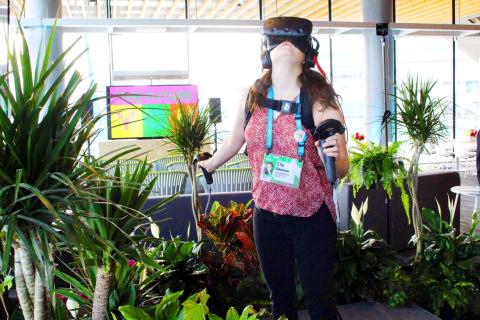A pair of filmmakers at the prestigious TED Conference used virtual reality (VR) to allow people to experience the ravages of deforestation — from the perspective of a tree.
A presentation on Thursday titled Tree combined sound, sight, smell and touch to let people feel first-hand what is lost when lush forest burns down.
“It was very real: At one point I was going to take the headset off and ask about the fire,” TED attendee Elle Luna said after trying Tree. “Your thinking mind sort of stops and you just feel it all.”

Photo: AFP
The experience gets under way when participants step onto a platform surrounded by tall, potted plants.
Each person buries a seed symbolically in soil before donning virtual reality headgear and an interactive vest that squeezes or vibrates on cues.
From there, they virtually become the seed.
Looking down, roots are seen sprouting and the participants are transported by the smell of rich earth as they rise to the surface and break into sunlight on a forest floor.
They grow to be tall trees, with birds, monkeys and other creatures perching or climbing on arms transformed into long branches under a glorious sky.
Fans simulate wind. Heaters provide the illusion of the sun’s warmth. The platform and interactive vest tremble as you grow or sway.
Then comes the sound and shake of engines and chainsaws. The smell of smoke, provided by a member of the Tree team lighting a match in the real world, draws attention to a fire devouring the forest.
In the final moments, one becomes a virtual ash floating away. A seed appears to float in the thick smoke in a parting hint of hope that life will start anew.
“It is the story of life and death of being,” one of the creators Milica Zec said. “Everything is amazing until humans come to the forest, then we replace that with forest and everything is taken away from you.”
Not wanting people to end Tree on too grim a note, they are given a real seed to plant along with information about how to connect with the Rainforest Alliance for ways to help fight deforestation.
“We are able to dissolve the screen; now you are the subject,” Tree co-creator Winslow Porter said. “People leave and tell their friends they were a tree.”

The US dollar was trading at NT$29.7 at 10am today on the Taipei Foreign Exchange, as the New Taiwan dollar gained NT$1.364 from the previous close last week. The NT dollar continued to rise today, after surging 3.07 percent on Friday. After opening at NT$30.91, the NT dollar gained more than NT$1 in just 15 minutes, briefly passing the NT$30 mark. Before the US Department of the Treasury's semi-annual currency report came out, expectations that the NT dollar would keep rising were already building. The NT dollar on Friday closed at NT$31.064, up by NT$0.953 — a 3.07 percent single-day gain. Today,

‘SHORT TERM’: The local currency would likely remain strong in the near term, driven by anticipated US trade pressure, capital inflows and expectations of a US Fed rate cut The US dollar is expected to fall below NT$30 in the near term, as traders anticipate increased pressure from Washington for Taiwan to allow the New Taiwan dollar to appreciate, Cathay United Bank (國泰世華銀行) chief economist Lin Chi-chao (林啟超) said. Following a sharp drop in the greenback against the NT dollar on Friday, Lin told the Central News Agency that the local currency is likely to remain strong in the short term, driven in part by market psychology surrounding anticipated US policy pressure. On Friday, the US dollar fell NT$0.953, or 3.07 percent, closing at NT$31.064 — its lowest level since Jan.

The New Taiwan dollar and Taiwanese stocks surged on signs that trade tensions between the world’s top two economies might start easing and as US tech earnings boosted the outlook of the nation’s semiconductor exports. The NT dollar strengthened as much as 3.8 percent versus the US dollar to 30.815, the biggest intraday gain since January 2011, closing at NT$31.064. The benchmark TAIEX jumped 2.73 percent to outperform the region’s equity gauges. Outlook for global trade improved after China said it is assessing possible trade talks with the US, providing a boost for the nation’s currency and shares. As the NT dollar

The Financial Supervisory Commission (FSC) yesterday met with some of the nation’s largest insurance companies as a skyrocketing New Taiwan dollar piles pressure on their hundreds of billions of dollars in US bond investments. The commission has asked some life insurance firms, among the biggest Asian holders of US debt, to discuss how the rapidly strengthening NT dollar has impacted their operations, people familiar with the matter said. The meeting took place as the NT dollar jumped as much as 5 percent yesterday, its biggest intraday gain in more than three decades. The local currency surged as exporters rushed to